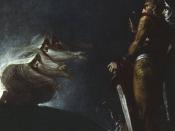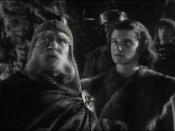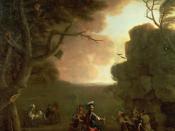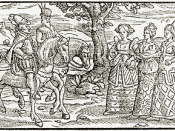At the beginning of the play Macbeth is a hero. He is the brave and valiant general who fights savagely to defeat the rebels trying to dethrone the king, as the wounded captain tells us. He seems to be an honourable soldier who serves his king well. People have the utmost respect for Macbeth and this is shown when they have to choose a new king after the murder of king Duncan, Macbeth is elected, even though Malcolm was the heir to the throne.
Though quite early on in the play, we see that Macbeth has been having unthinkable thoughts. When the witches tell him that he will be king, he starts. This is not because he is shocked at the thought, but quite the opposite. He had obviously been thinking of taking the crown for himself, and the only way to have done that would have been by regicide, as he was not next in line for the throne.
But people would never suspect such a thing of Macbeth, not even Banquo, his closest friend, who takes Macbeth's reaction to the revelation that he will be king as surprise. Banquo thinks so highly of Macbeth that he thinks that the witches' prophecy to be fair: Good sir, why do you start and seem to fear Things that do sound so fair? When the first part of the witches' prophecy, that Macbeth will become Thane of Cawdor, comes true, Macbeth starts to get ideas. Not the mild and harmless thoughts he had before, but he actually started forming plans to murder the king. This is shown by his reaction to the news that he has been made Thane of Cawdor.
Glamis, and Thane of Cawdor: The greatest is behind.
Macbeth has just been honoured by the king and the first thing he thinks about is the witches' prophecy and that now he has been made Thane of Cawdor he is halfway to becoming king. This shows us that Macbeth is a very driven and ambitious person, who will forsake everything to get ahead. He has a very dark mind and this is the first sign in the play that Macbeth really isn't the hero everyone thinks he is but is much darker. This is hinted at when the wounded captain describes the battle to the king. He says that Macbeth will "memorise another Golgotha." He means this as a compliment, but it seems a bit dark. With hindsight we can see that it is a hint to Macbeth's true personality, and shows just how ruthless he really is.
Macbeth also has a very good relationship with his wife and we are shown by the letter he sends her that he tells her everything. Lady Macbeth is also very supportive of Macbeth, she knows that he does not have the nerve to carry out what he intends on his own and so needs his wife to support and goad him. Yet once they have committed the dreadful deed they start to grow apart. This is shown by when he arranges for the murder of Fleance and Banquo; he does not tell Lady Macbeth what he is going to do: there shall be done A deed of dreadful note.
Yet when Lady Macbeth asks "what's to be done?" he does not tell her. This shows just how far they have grown apart: at the start he would tell her his most outrageous thoughts about killing the king, yet now he won't even tell her what his plans are.
Macbeth does not find it easy to kill the king. He tells Lady Macbeth "we will proceed no further in this business" [of murdering the king]. And it takes Lady Macbeth to goad him into continuing by questioning his manhood. And once Macbeth has committed the crime he complains: I could not say 'Amen' When they did say 'God bless us.' This shows that Macbeth has now been cut off from God. This shows how religious he actually was, as it makes a big difference to him whether he has God on his side or not. And now once cut off from God he has nothing stopping him from becoming a cruel tyrant as king of Scotland. This is also a factor in why he becomes distant to his wife as he is so alone now that God has turned His back on Macbeth. The absence of God from Macbeth makes him become self obsessed and solipsistic. He can no longer deal with the world around him now. As after he has had Banquo murdered he still waits for him and toasts to him at the banquet: I drink to th'general joy o'th'whole table, And to our dear friend Banquo, whom we miss.
Would he were here! On one level Macbeth has got rid of someone he perceives as a potential threat by murdering Banquo, yet on another level he does not understand what results his actions will have. Banquo after all is his oldest and dearest friend, and Macbeth really does miss his presence. Macbeth is no longer mentally stable and is certainly not fit to be king if he can arrange the murder of his closest friend, yet wonder why he has not turned up to a banquet that evening.
By act 4 Macbeth has become so paranoid and insecure; he visits the witches again to demand further prophecies. The witches use equivocation when they tell Macbeth what will happen. Macbeth is told: The power of man, for none of woman born Shall harm Macbeth.
This convinces Macbeth that he has nothing to fear. It is not until the scream of his wife committing suicide that he says: I have almost forgot the taste of fears; This fearlessness completely desensitises him and he loses any shred of humanity he had left, and he becomes a complete monster. He is so cruel that he can order the slaughter of the women and children of Macduff's castle, when Macduff flees from him.
It is this attitude which drives Lady Macbeth to suicide, as she committed a very sacrilegious act by murdering the king. And without the support of Macbeth she cannot bear her sin on her conscience, and this drives her mad.
Macbeth only regains some of his former valour when he realizes that he has lost the battle. He is fighting Macduff when he finds out that Macduff was born by caesarean section, so was not actually "of woman born." Macbeth realizes he cannot defeat Macduff but decides to fight on honourably, knowing he will die. This is a glimpse of the man Macbeth could have been had he taken the right course in his life.





